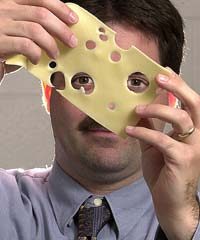Process Engineering
This special field revolves around processes for modifying material properties (milling, cooling), composition (filtration, distillation) and type (oxidation, hydration).
Valuable information is available on a broad range of technologies including material separation, laser processes, measuring techniques and robot engineering in addition to testing methods and coating and materials analysis processes.

NESTA radar hits water leaks
What would you use to try and find an underground water leak, your ears or radar? Believe it or not the only way to find water leaks involves trying to hear the hiss of the leak through a device like a stethoscope. This antiquated system could soon be a thing of the past as a fast and full-proof method using radar is being developed thanks to an investment of £76,810 from NESTA (the National Endowment for Science, Technology & the Arts), the organisation that invests in UK creativity and innovation.

Interesting Approaches in Model Construction for Controlling a Glass Melt
In this year’s competition of the international scientific association, EUNITE, three teams have succeeded in predicting the temporal development of the five response signals in the process control of a glass melting tank (with 29 input parameters) over a period of two weeks. The – weighted – deviation of the modelled values from the real values was 0.3 per cent. The winners will present their results at the EUNITE Conference from 10th to 12th July in Oulu, Finland. As an expression of its gratitude,

Breakthrough for a greener paper industry
A new approach that makes paper from straw, which cuts production costs and is kinder to the planet, is one step closer to reality thanks to an investment award of £90,500 from NESTA (the National Endowment for Science, Technology and the Arts) – the organisation that nurtures UK creativity and innovation.
The innovation is the brainchild of a Surrey-based environmental company, BioRegional MiniMills Ltd. The driving force behind this company is a former nurse, Sue Riddlestone who became ver

A new aluminium alloy to improve aircraft brakes
Aircraft wheel and brake assemblies can become very hot during braking as the plane’s kinetic energy is transformed into heat by brake pads and dissipated into the surrounding components. The wheel, the tyres, the piston that clamps the pads into place and the metal housing of the brakes are all subject to sudden and intense heat. Now a new aluminium alloy eases manufacturers’’ fears of failure by handling the heat better.
The new alloy therefore forms a key component of a car

Carnegie Mellon demonstrates autonomous robot
Explores abandoned mine
Carnegie Mellon University researchers, working with the Pennsylvania Department of Environmental Protection (DEP) and the U.S. Department of Labor’s Mine Safety and Health Administration (MSHA), will demonstrate a prototype, autonomous wheeled robot today as it explores and maps a 3,500-foot corridor of an abandoned coal mine near New Eagle in southwestern Pennsylvania.
Named Groundhog, the robot was developed by students in the Robotics Institut

Accurate milk enzyme measurement may cut cheese processing cost
A new method to accurately measure quantities of a cheese-ripening enzyme in milk could reduce the time and cost of producing cheese, according to a report by Purdue University researchers.
Infrared spectroscopy was used in combination with statistical analysis to determine the concentration of plasminogen, a form of the enzyme integral to cheese manufacturing. The study, by co-authors Lisa Mauer and Kirby Hayes, both assistant professors in the Department of Food Science, is published in th